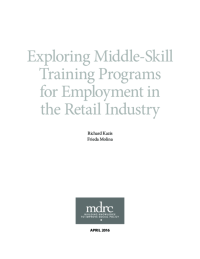Exploring Middle-Skill Training Programs for Employment in the Retail Industry

The retail industry is a huge and growing sector of the U.S. economy, accounting for about 10 percent of the nation’s jobs in 2013 and projected to increase by 7 percent between 2012 and 2022. The sheer size of the industry and the number of employment opportunities it affords low-skilled workers led MDRC to explore the potential of the retail sector as a ladder to middle-skill and middle-income jobs. MDRC wanted to understand more about the national experience among nonprofit workforce training providers preparing low-skilled youth and adults for middle-skill jobs in retail, and to assess the potential for expanding these efforts.
In 2015, with support from the Walmart Foundation, MDRC conducted a national survey to begin to answer these questions, focusing on programs delivered by community-based nonprofit organizations. The resulting report is based on interviews with more than 70 policymakers, industry representatives, workforce development funders and practitioners, and others.
Key Findings
- This broad survey of current practice yielded an unexpected finding: few nonprofit workforce training programs that prepare low-skilled workers for careers in the retail industry focus on middle-skill jobs; most instead focus on low-wage, entry-level positions. Community-based training programs targeting middle-skill jobs operate on a relatively small scale.
- The opportunity exists, however, to create more workforce training programs that prepare low-income individuals for middle-skill job opportunities in the retail industry, if retail employers, particularly large national firms, and nonprofit providers work together to overcome current obstacles and disincentives to developing these training programs.
- Factors that constrain nonprofit workforce training providers from developing programs that target middle-skill jobs in retail are varied. The relatively limited opportunity for career advancement in entry-level retail positions dissuade many providers from spending scarce and valuable staff time trying to identify and target higher-wage niches in the industry. Human resource practices in the retail industry present additional challenges. Firms tend not to share information on recruitment and hiring for fear of losing a competitive edge; lean staffing of retail stores makes it hard for providers to find partners with the time to collaborate on the design of well-targeted programs; and retail firms that promote employees internally often train in-house rather than partnering with external providers.
Staff from nonprofit providers and retail hiring managers identified several strategies for improving the current dynamics between them. Providers would welcome better and more information about job opportunities, high-growth occupations, and robust career paths in retail. Strengthening regular communication between retail employers and training providers might reduce misinformation and negative stereotyping among staff at both. Experimenting with new and creative partnerships and approaches to expanding training options for high-demand, middle-skill retail jobs, and careful research on those efforts, could encourage providers to commit more resources to preparing clients for careers in the retail industry.






